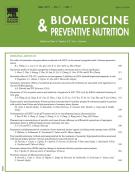Quercetin protects against cadmium-induced biochemical and structural changes in rat liver revealed by FT-IR spectroscopy - 12/09/12
Abstract |
Cadmium (Cd) is a toxic metal occurring in the environment naturally and as a pollutant emanating from industrial and agricultural sources. Quercetin is a naturally occurring flavonoid which has been reported to have a wide range of pharmacological properties. The aim of the present study is to investigate the protective effect of quercetin in modifying the biochemical and structural changes at the molecular level in Cd-intoxicated liver tissues in Wistar rats by using Fourier transform infrared (FT-IR) spectroscopy. FT-IR spectroscopy allows us rapid and sensitive determination of functional groups belonging to proteins, lipids, carbohydrates and nucleic acids simultaneously. The results revealed that there is a significant decrease in the amount of unsaturated lipids in Cd-intoxicated liver, which indicates an increase in lipid peroxidation. In addition, there is a significant increase in the amount of saturated lipids, collagen and glycogen contents in the Cd-intoxicated liver tissues. Moreover, the significant increase in lipid order and a decrease in protein to lipid ratio are observed. Furthermore, a decrease in the intensity/area of the amide I band and shifting of the position of this band to lower frequency values in Cd-intoxicated liver indicates structural changes in proteins. Detailed secondary structure analysis of the amide I band reveals a significant increase in random coil and antiparallel β-sheet structures and a decrease in ⍺-helix and aggregated β-sheet structures, which indicates protein denaturation due to oxidative modification. Administration of quercetin significantly decreases the levels of hepatic lipids and collagen that are found to increase in Cd-intoxicated liver tissues. In conclusion, the results of the present study suggest that quercetin may exert its antioxidative effect by modulating the biochemical and structural changes at the molecular level during Cd-intoxicated liver tissues, which can be detected by using FT-IR spectroscopic technique.
Le texte complet de cet article est disponible en PDF.Keywords : Cadmium, Quercetin, FT-IR, Liver, Biochemical composition
Plan
Vol 2 - N° 3
P. 179-185 - juillet 2012 Retour au numéroBienvenue sur EM-consulte, la référence des professionnels de santé.
L’accès au texte intégral de cet article nécessite un abonnement.
Déjà abonné à cette revue ?


